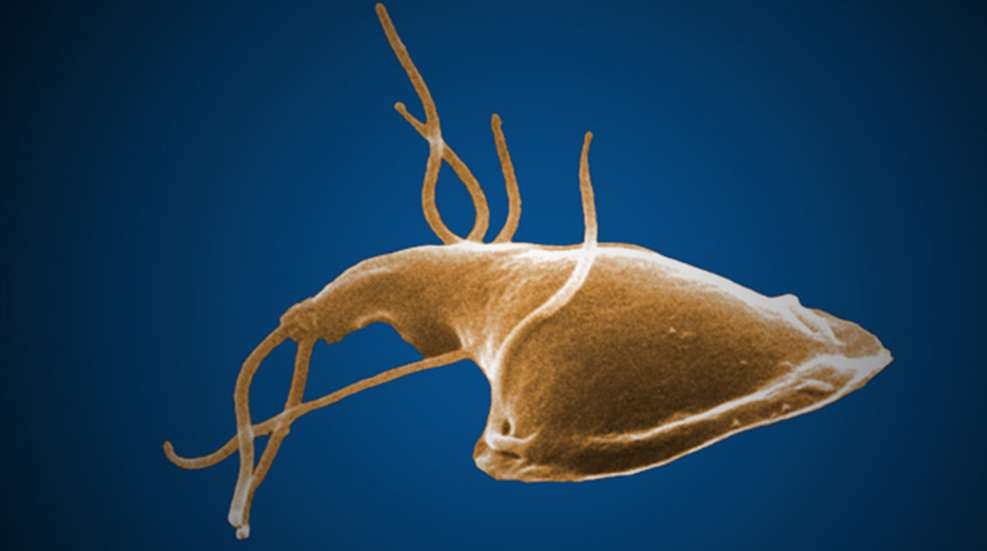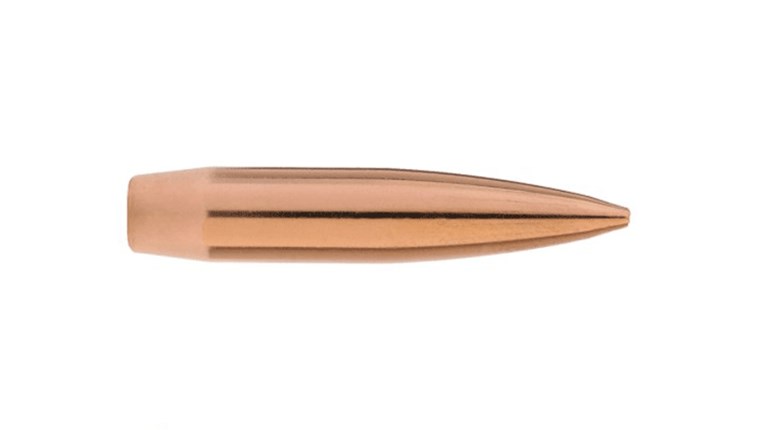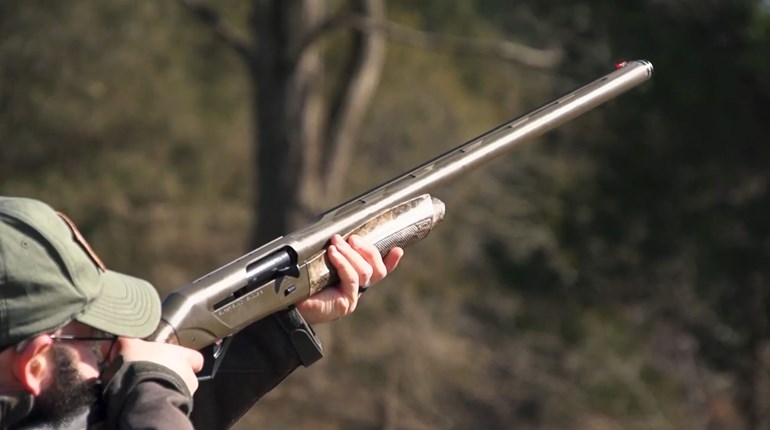** When you buy products through the links on our site, we may earn a commission that supports NRA's mission to protect, preserve and defend the Second Amendment. **

Is there anything in Nature prettier than a burbling mountain stream wending its merry way o'er hill and dale? Maybe not, but if you spend any time in the outdoors, you should know that the soothing chime of fresh, cold water can mask a pretty serious hazard to your health: Giardia. In a nutshell, Giardia is a microscopic parasite that contaminates most untreated freshwater bodies in North America—and if you wind up infected with it, you're going to have a Very Bad Time, indeed. Here are four things you really need to know about Giardia...along with our advance apology for ruining your lunch.
1. You Cannot Predict Whether Water is Contaminated
According to the CDC, Giardia is found in every region of the United States. It's invisible to the naked eye, and it can be present in clear, running water as well as stagnant water. The color of the water or presence of visible particulates won't give you any clues as to whether or not Giardia is present. Because Giardia is spread by fecal contamination, a stream that was safe to drink from two weeks ago might not be now; all that has to have happened was another hiker or hunter answering the call of Nature a little too close to said stream. It can also be spread by animal waste, and given that we have no way to prevent animals from going wherever they feel like it, you should generally treat all wilderness bodies of water as if they're contaminated.
2. You Don't Have to "Drink" the Water to Get It
Contracting the Giardia parasite doesn't necessarily involve taking a long drink from a river. Many people catch it simply by swimming in contaminated water—the organism can't get through your skin, but how often do you go swimming without inadvertently swallowing a little bit of water? Additionally, there are things that we all do more or less automatically that can get a tiny quantity of contaminated water into our systems. For example (and I learned this one the hard way), rinsing your toothbrush in contaminated water is more than enough to get you sick. Giardia, like many waterborne parasites, forms a very hardy cyst (ugh) around itself that allows the organism to survive months outside the water and exposure to chemicals such as chlorine.
3. You Probably Won't Die (But You Might Want To)
Probably the most salient feature of the Giardia parasite is its efficiency at spreading itself. Not only is the organism itself remarkably hardy (see above), it usually takes a week or more for symptoms to appear. During this time, you're contagious...but you don't know it, so you may not be taking all the precautions necessary to prevent person-to-person spread of the disease. Once symptoms do appear, Giardia does its best to spread itself by making the medium in which it lives—uh, feces—abundant. Uncontrollably, painfully, frequently, seemingly physics-defyingly abundant. In countries like the U.S. where there's good access to medical care, it's rarely fatal, but it's absolutely miserable. The symptoms can persist for weeks and, weirdly enough, might result in the infected person becoming lactose intolerant. Yes, that's right: Rinsing your toothbrush in the wrong river can leave you unable to enjoy ice cream long after you've gotten over the illness.
4. It's Like a Franchise Horror-Movie Villain: Hard to Kill
Remember a couple of paragraphs ago, when we mentioned the hardiness of the cyst (gross) that forms around the Giardia microorganism? That cyst (ew) protects the parasite against months outside the water and freezing temperatures, and makes it partially resistant against common water purifiers such as iodine and chlorine. According to the CDC article linked in the last sentence, the best way to kill Giardia is to bring water to a full, rolling boil for at least a minute (and at least three minutes at altitudes over 6,500 feet). There are also some specialized filters that will eliminate Giardia; this page is the CDC's guide to removing cryptosporidium, which is an even hardier but less endemic parasite, so filters that remove it will also remove Giardia.
Stay safe and healthy in the outdoors! (And again, we're sorry about ruining your lunch.)
Lead image courtesy CDC
1. You Cannot Predict Whether Water is Contaminated
According to the CDC, Giardia is found in every region of the United States. It's invisible to the naked eye, and it can be present in clear, running water as well as stagnant water. The color of the water or presence of visible particulates won't give you any clues as to whether or not Giardia is present. Because Giardia is spread by fecal contamination, a stream that was safe to drink from two weeks ago might not be now; all that has to have happened was another hiker or hunter answering the call of Nature a little too close to said stream. It can also be spread by animal waste, and given that we have no way to prevent animals from going wherever they feel like it, you should generally treat all wilderness bodies of water as if they're contaminated.
2. You Don't Have to "Drink" the Water to Get It
Contracting the Giardia parasite doesn't necessarily involve taking a long drink from a river. Many people catch it simply by swimming in contaminated water—the organism can't get through your skin, but how often do you go swimming without inadvertently swallowing a little bit of water? Additionally, there are things that we all do more or less automatically that can get a tiny quantity of contaminated water into our systems. For example (and I learned this one the hard way), rinsing your toothbrush in contaminated water is more than enough to get you sick. Giardia, like many waterborne parasites, forms a very hardy cyst (ugh) around itself that allows the organism to survive months outside the water and exposure to chemicals such as chlorine.
3. You Probably Won't Die (But You Might Want To)
Probably the most salient feature of the Giardia parasite is its efficiency at spreading itself. Not only is the organism itself remarkably hardy (see above), it usually takes a week or more for symptoms to appear. During this time, you're contagious...but you don't know it, so you may not be taking all the precautions necessary to prevent person-to-person spread of the disease. Once symptoms do appear, Giardia does its best to spread itself by making the medium in which it lives—uh, feces—abundant. Uncontrollably, painfully, frequently, seemingly physics-defyingly abundant. In countries like the U.S. where there's good access to medical care, it's rarely fatal, but it's absolutely miserable. The symptoms can persist for weeks and, weirdly enough, might result in the infected person becoming lactose intolerant. Yes, that's right: Rinsing your toothbrush in the wrong river can leave you unable to enjoy ice cream long after you've gotten over the illness.
4. It's Like a Franchise Horror-Movie Villain: Hard to Kill
Remember a couple of paragraphs ago, when we mentioned the hardiness of the cyst (gross) that forms around the Giardia microorganism? That cyst (ew) protects the parasite against months outside the water and freezing temperatures, and makes it partially resistant against common water purifiers such as iodine and chlorine. According to the CDC article linked in the last sentence, the best way to kill Giardia is to bring water to a full, rolling boil for at least a minute (and at least three minutes at altitudes over 6,500 feet). There are also some specialized filters that will eliminate Giardia; this page is the CDC's guide to removing cryptosporidium, which is an even hardier but less endemic parasite, so filters that remove it will also remove Giardia.
Stay safe and healthy in the outdoors! (And again, we're sorry about ruining your lunch.)
Lead image courtesy CDC







































